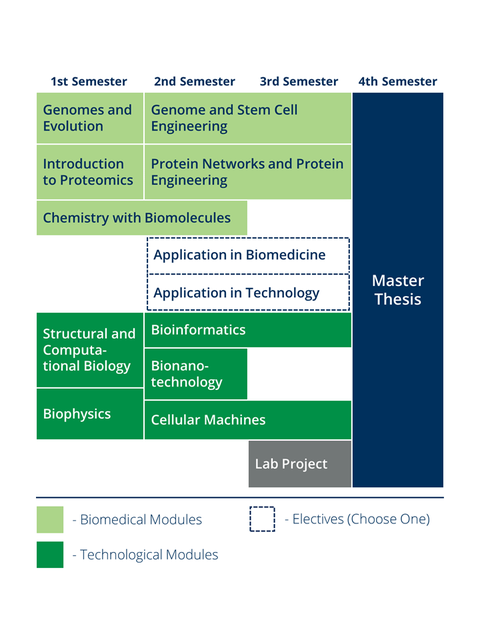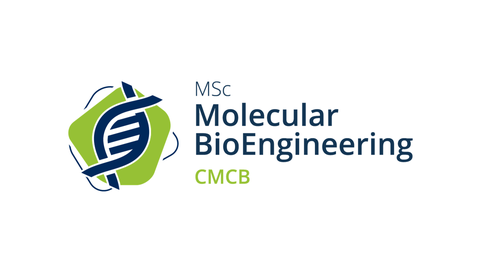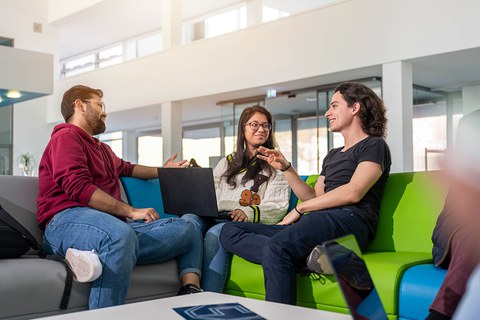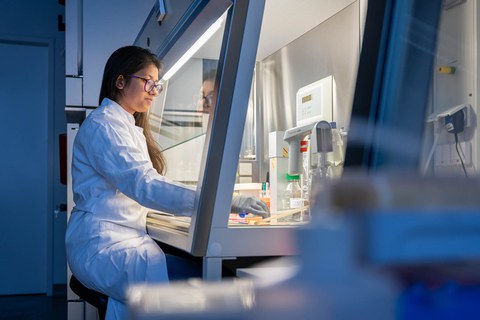Molecular Bioengineering
Inhaltsverzeichnis
Molecular Bioengineering at a Glance
| Degree | Master of Science |
| Language | English |
| Tuition | None |
| Start | Winter Semester (October) |
| Duration |
4 semesters |
| Internationality | Approximately 70% of the students come from outside Germany |
Why Molecular Bioengineering Master's Program?
Let’s move to the nanoscale! It is at this level of spatial resolution that 21st-century technology meets modern biology.
Proteins, the mighty molecules in our cells and all life on Earth are nanomachines encoded in a genetic language. They function at a much smaller scale and a greater efficiency than is currently possible with the available micro-technologies. Become a molecular bioengineer and learn how to engineer cellular machines.
The Molecular Bioengineering program brings together a novel combination of biology, biochemistry, biophysics, material science, medical science, bioinformatics, and nanotechnology.
Join us and learn the fundamentals of biology, biomedicine, and bionanotechnology. Combine life science with technology. Explore biology to understand how nature engineers its mighty molecules. Use nanotechnology and computational biology to engineer nanomachines, tiny molecular factories, and biomaterials for medical and industrial applications.
Teaching Staff
Experience state-of-the art teaching by the CMCB’s esteemed professors and group leaders.
During the course of the studies, you will be guided by renowned scientists from the Biotechnology Center (BIOTEC) and the B CUBE - Center for Molecular Bioengineering.
Their expertise is complemented by colleagues from the Max Planck Institute for Molecular Biology and Genetics (MPI-CBG), Max Bergmann Center of Biomaterials (MBC), Leibniz-Institute for Polymer Research (IPF), and the Medical Theoretical Center (MTZ).
Internationality
Immerse yourself in an international learning environment, where over 60% of students come from outside of Germany, representing a diverse array of backgrounds and perspectives.
Career Prospects
The dynamic development in life sciences and biotechnology creates a huge demand for qualified scientists in these areas. Graduates of the Molecular Bioengineering program should be able to find appropriate positions in research institutes as well as in biotechnology, pharmaceutical, and software industry.
Curriculum

Curriculum of the Molecular Bioengineering Master's Program
The Molecular Bioengineering is a comprehensive Master's program. Over the course of four semesters, the students receive a well-rounded education and gain sought-after wet-lab skills.
Biomedical and Technological Modules
The initial three semesters are dedicated to build foundational knowledge in a variety of courses that fall into two categories:
- The biomedical modules comprise genomics and stem cell engineering, proteomics, and chemistry with biomolecules.
- The technological modules include bioinformatics, bionanotechnology and biomaterials, biophysics and cellular machines.
Elective Modules
Starting in the second semester, the students have an opportunity to dive deeper in their areas of interest by selecting one out of two elective (optional) modules:
- application in biomedicine (Materials in Biomedicine, Biomedical Tissue Engineering)
- application in technology (Microsystems Technology, Applied Bionanotechnology)
Students also have an opportunity to participate in a workshop on public and economic aspects of bioengineering that discusses ethical and legal issues, patenting, and skills required to found and lead biotechnological companies.
Lab Project
Over the course of the third semester, the students have the ability to gain valuable hands-on experience in one of the laboratories at the CMCB, TU Dresden, or partner institution.
Master's Thesis
The studies culminate in the fourth semester which is dedicated to the Master's thesis. The students have the flexibility to choose from a variety of research topics and work in one of the research groups at the B CUBE, BIOTEC, or CRTD. They can also reach out to groups at other TU Dresden departments or partner institutions.
Application Requirements
We encourage highly qualified students of all nationalities to apply.
Applicants must fulfill the following requirements:
Bachelor's degree, Diploma degree, or an equivalent qualification in one of the following fields:
- Biology / Life Sciences
- Biotechnology
- Chemistry / Biochemistry
- Computer Science
- Materials Science
- Medicine
- Nanotechnology
- Physics
- diploma of secondary school or university completed in English
- TOEFL: minimum 92 points internet-based
- IELTS: minimum 6.5
- certificates of other tests of equivalent standard will also be considered, e.g., UniCERT, CAE, CPE
Basic knowledge in biochemistry, cell biology, materials science, physics, and mathematics.
Please note that Chinese, Vietnamese, and Indian applicants need to provide the APS (Akademische Prüfstelle) from the Academic Evaluation Centre at the German Embassy.
Please note: The German Admission Regulations document is the authoritative version. The English version is a courtesy translation. In case of ambiguity, please refer to the German documents.
The application period runs from April 1 - May 31 for admissions in winter term.
You'll find complete information on the application procedure on the How To Apply website below.
PhD Early Admission
Through a cooperation between the Dresden International PhD program (DIPP) and the CMCB, there is a possibility for an early admission for a PhD within the DIPP program. Selected students have an option of starting a PhD after their 3rd semester of Master's program. The decision is made based on performance and reference letters.
Admitted students may either directly enter the PhD program without completing the Master's degree or first complete the MSc, and then join the PhD program.
Supporting Study Documents
You can find the study documents for download below. Please note that the English documents are a courtesy translation and only the German version of the documents is legally binding!



